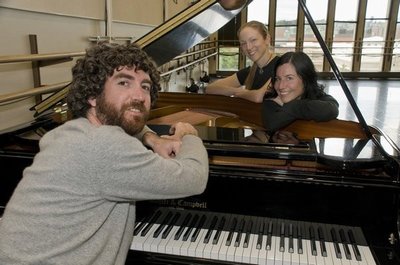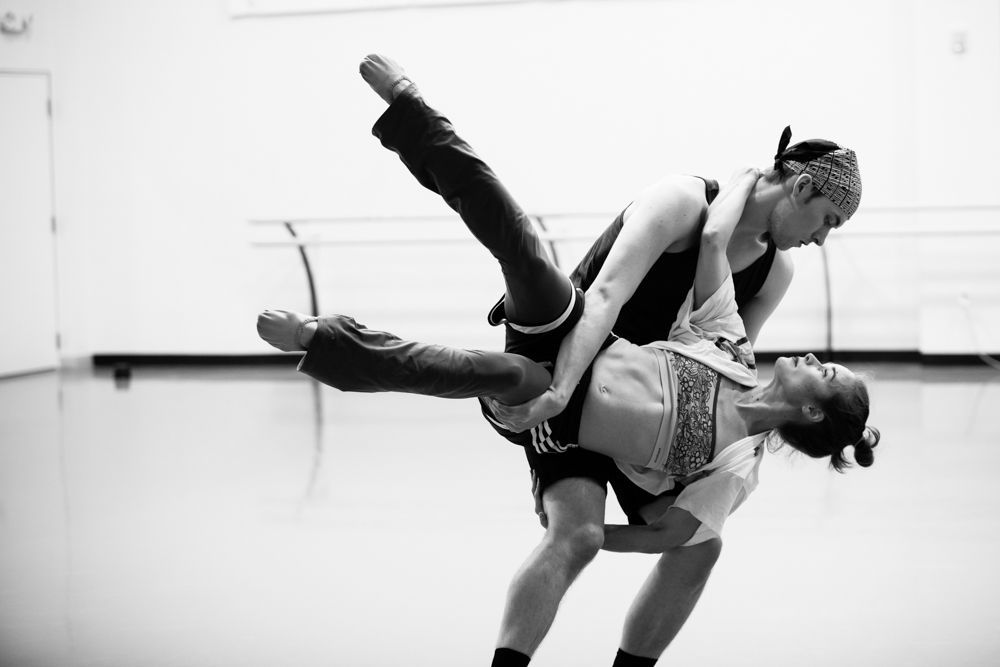“I’m kind of a crazy person,” says Paul Matthew Moore cheerfully. “I love random things that come by.” His enthusiasm and energy are great, his taste in music composition eclectic, running the gamut from classical (including symphonic and choral works) to jazz to psychedelic rock to avant garde. It is he who has composed the music for Penny Saunders‘s Soir Bleu, one of the three new pieces in Whim W’Him‘s January 16-18, 2015 program Threefold.
Paul first played for dance at the University of California Santa Barbara‘s College of Creative Studies, where he earned his BA in Music Composition in 1993. A couple of years later, he was hired as music director at the University of Washington Dance Department and has been there ever since. In this capacity, he writes music for three or so dance pieces per annum. Over the years, he also has composed films scores—sixteen of them in fact, including Police Beat and Robinson Devor‘s Zoo, which competed at the Sundance and Cannes festivals. His faculty profile on the department website aptly calls him “a versatile and intuitive dance musician” and notes that “Paul draws on keyboard, guitar, drum set and found objects to galvanize technique classes.” He teaches music classes for dance majors as well, and is known for assigning his students interesting tasks, such as: “Bring in a true example of real art.”
Since moving to Seattle, Paul has worked with Wayne Horvitz, Eyvind Kang, Timothy Young, Tim Hecker, Randall Dunn, Stuart Dempster, and Kronos Quartet, among many others. He has transcribed and performed scores for ten seasons of the UW Dance Department’s Chamber Dance Company and has collaborated with a variety of choreographers, including Mark Dendy, Mark Haim, Rob Kitsos, and Jennifer Salk.
Working with Dayna Hanson on the film Improvement Club, and touring with her live theater piece Gloria’s Cause, he met dancer Jim Kent who introduced him to Whim W’Him, and he’s excited to be working with the company. He met Penny through her husband, Pablo Piantino, an MA student in dance at UW and a member of Chamber Dance. “Usually when a composer is hired, it’s because they’ve connected you with something of yours that they’ve heard,” says Paul. “Penny heard my accompanying ballet class and found something she wanted to pull out.”
Penny’s Soir Bleu is inspired by the paintings of Edward Hopper, as is the score for it.
“I relate to lonely, sad people,” Paul says and continues: “I went through a bunch of conflicts of inspiration.” In painting, Edward Hopper and his wife Josephine (Jo) “were drawn to each other by similarities. They were into realism, not abstraction.” Paul finds the paintings evocative of Film noir and its music. In looking for an appropriate musical idiom for Soir Bleu, “I tried out some jazzy things—his characters would like it.”
But according to biographies, Edward and Jo Hopper did not like jazz. They liked Strauss waltzes. Likewise, Ravel and Debussy are among Paul’s favorite composers, but “the music was too freaky for Hopper. He wasn’t interested, though he was in Paris at that time. He was old fashioned for his era, more attuned to the nineteenth than the twentieth century in the arts.”
And then there was the question for Paul of how to relate the music of Soir Bleu to 2014. Creating music for another person’s choreography has interesting dynamics. “People of my generation,” he remarks, “and in college now, have to come to terms with minimalism. Film-makers love it, dance choreographers love it beyond anything. It’s not challenging— technically it’s a piece of cake, and my own teachers would fail minimalist compositions. They were steeped in atonal. Harder to compose, and to listen to—the choreographic audience is very different musically in what it wants.”
Penny was definite about specifying no electronics, as inappropriate to Hopper’s time, but instead plain acoustic music, “which I love,” Paul notes. He adds “This is some of the most clear, normal music I’ve made in a while.”
https://soundcloud.com/paul-matthew-moore
With its slowly evolving minimalist iteration of phrases, it underscores the stillness of the paintings and the recurring but unresolved tensions in Hopper’s relationship with his wife, how “they fought and loved and hated and supported each other.”
Paul Moore has held a steadier job than many composers and had opportunities to collaborate with many choreographers. That has meant learning to tune into the needs of other people. “I’ve worked so long under others,” says Paul, whose parameters “require stepping outside of what I’d do on my own.” He adds, “I try to be selfless. It’s good for me.” But he is also eager to do more of his own work, to find out where his own musical needs and desires lead him. So after the turn of the year, when he has completed two pieces for a faculty dance concert, Paul is going to try composing “on my own. I’ll try being the boss.” The last time he did something like that was 1998-2001, when he experimented with “very slow music, electronic and acoustic.”
Right now he doesn’t know what new directions he will take.
“My personal journey,” he avows, “is still going on.”



